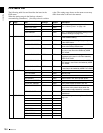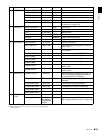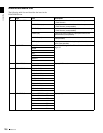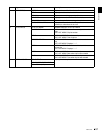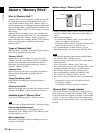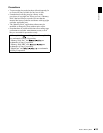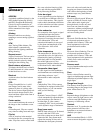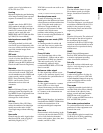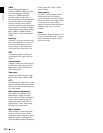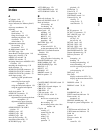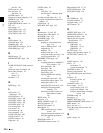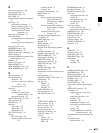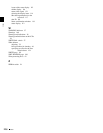
Appendixes
202
Glossary
UMID
Unique Material Identifier. A
standard (SMPTE 330M) for video
and audio metadata. The Basic
section of a UMID contains a
globally unique number and a
material number for the identification
of recorded material. An optional
section called the “Source Pack”
contains information such as the time
and location of recording. A UMID
with the Basic section only is called a
Basic UMID. A UMID with the
Source Pack is called an Extended
UMID.
User bits
A total of 32 bits are provided in the
time code which the user can use to
record such information as date,
scene number, or reel number on
video tape. Also called user’s bits.
VBS
A composite signal consisting of
video signal, burst signal and sync
signal.
Vertical smear
A bright vertical line which appears
on the screen when shooting a very
bright object with a CCD camera.
Also called smear.
Video gain
Amount of amplification for video
signals, expressed in decibels (dB).
VITC
Vertical Interval Time Code. A time
code recorded in two horizontal lines
during each vertical blanking period
of a video signal.
White balance adjustment
In the light of a particular color
temperature, to adjust the white
levels of the R, G, and B channels of
a color video camera so that any
white object shot in that light is
reproduced as a truly white image.
See also Color temperature.
White shading
When shooting a white object, the
upper and lower portions of the
screen may appear magenta or green
while the central portion appears
white, depending on the performance
of the camera lens. This is called
white shading.
Zebra pattern
In a video camera, striped patterns
which appear in the viewfinder
screen to indicate areas of the image
where the video level is higher than a
certain value. If a zebra pattern
appears on the skin when the object is
a human being, that is a correct
exposure.
Zoom
To gradually change the field of view
of a camera lens from wide to narrow
angle (zoom in) or narrow to wide
angle (zoom out).




